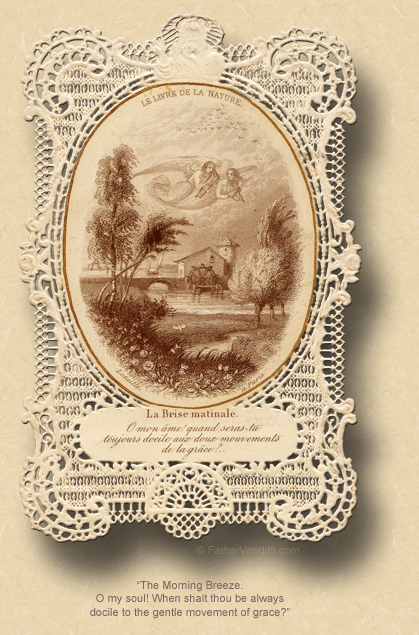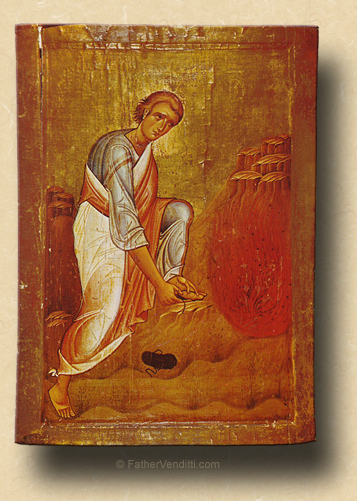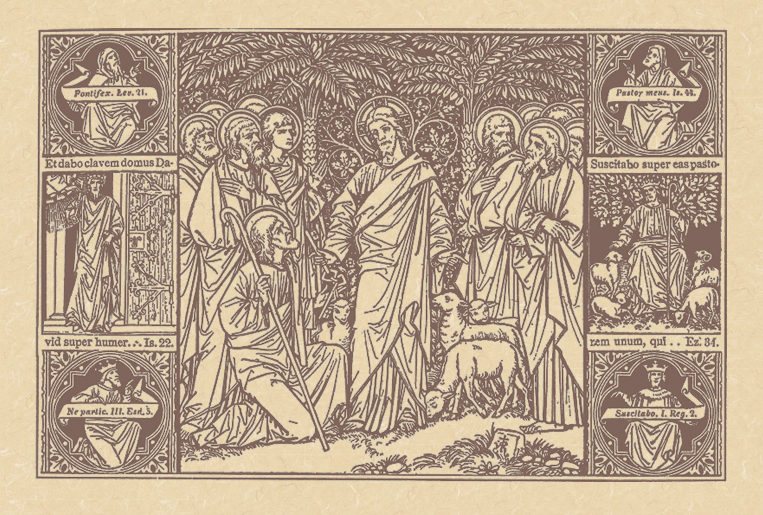Yes, This Will Be on the Exam.
The Twenty-First Sunday of Ordinary Time.
Lessons from the primary dominica, according to the ordinary form of the Roman Rite:
• Isaiah 22: 19-23.
• Psalm 138: 1-3, 6, 8.
• Romans 11: 33-36.
• Matthew 16: 13-20.
The Twelfth Sunday after Pentecost.
Lessons from the dominica, according to the extraordinary form of the Roman Rite:
• II Corinthians 3: 4-9.
• Psalm 33: 2-3.
• Luke 10: 23-37.
The Twelfth Sunday after Pentecost; and, the Feast of Our Venerable Father Pimen.*
Lessons from the pentecostarion, according to the Ruthenian recension of the Byzantine Rite:
• I Corinthians 15: 1-11.
• Matthew 19: 16-26.
FatherVenditti.com
|
 8:19 AM 8/27/2017 — I'm sure you have noticed, when you're watching a drama series on TV, that when the story is a continuation of what happened in the show the week before, they'll sometimes begin an episode by saying, “Here are some scenes from last week…”; and they do that for the benefit of those who may have missed last week's episode. What escapes the notice of many Catholics, unfortunately, is that the cycle of Scripture lessons for the Sundays of the Church Year have been compiled over a thousand years to present to us a continual compendium of the Catholic Faith. That's one of the reasons—not the only reason, but one of the reasons—that's it's important not to miss Mass on Sunday. The most important reason, of course, is that it's a very serious sin to do so; and, at some point in the future we will have to look at the origins of, and the reasons for, what we call the “Sunday Obligation.” But another reason that assisting at Holy Mass every Sunday is important is that, when you miss a Sunday, a void is created in your hearing of the readings, and so the presentation of the Faith has holes in it that make understanding what our Lord is trying to teach us all the more difficult. 8:19 AM 8/27/2017 — I'm sure you have noticed, when you're watching a drama series on TV, that when the story is a continuation of what happened in the show the week before, they'll sometimes begin an episode by saying, “Here are some scenes from last week…”; and they do that for the benefit of those who may have missed last week's episode. What escapes the notice of many Catholics, unfortunately, is that the cycle of Scripture lessons for the Sundays of the Church Year have been compiled over a thousand years to present to us a continual compendium of the Catholic Faith. That's one of the reasons—not the only reason, but one of the reasons—that's it's important not to miss Mass on Sunday. The most important reason, of course, is that it's a very serious sin to do so; and, at some point in the future we will have to look at the origins of, and the reasons for, what we call the “Sunday Obligation.” But another reason that assisting at Holy Mass every Sunday is important is that, when you miss a Sunday, a void is created in your hearing of the readings, and so the presentation of the Faith has holes in it that make understanding what our Lord is trying to teach us all the more difficult.
Now, all of this is moot for those who go to Mass robotic-ally and who don't listen to the readings, and there are many of those; you see them every Sunday in your own parishes, I'm sure: they are distracted and agitated, their minds everywhere except on where they are and what they are doing. If we were perfectly honest with ourselves, we would have to admit that that's us, from time to time. Sometimes it's hard to avoid. Sometimes we're hampered by the reader, whose voice may be distracting or hard to understand, or whose delivery is less than reflective. Sometimes the homily of the priest or the deacon can be very poorly thought out, and this can distract us as well. Sometimes we've just got so many burdens pressing upon our minds—family problems, personal problems, money problems, health problems—that we're lucky we've managed to get ourselves there at all; and, all of that is certainly understandable.
But we know we should at least make the effort; and, making the effort this week brings us to a place we landed on very briefly at the end of last week's Scripture lessons. In fact, the lessons given to us for the last few Sundays, as well as the lessons presented during weekday Mass the last couple of weeks, have hammered home for us the themes of God's permissive will, and the importance of docility before the will of God, Whose ways are not our ways. I didn't do it intentionally, but last Sunday, commenting on the Blessed Apostle Paul's Epistle to the Romans, in which he reminds us that the rejection of Christ by the Jew's had the purpose of opening the doors of salvation to the rest of us, I had concluded the homily by reading for you the verses that immediately follow that passage, in which the Apostle reminds us of this very fact, asking us, “Who has ever understood the Lord’s thoughts, or been his counsellor? (11: 34 Knox).  You and I saw in that a way to understand our Blessed Lord's curious treatment of the woman featured in the Gospel lesson, who had traveled a great distance to seek our Lord's help for her daughter, and whom the Lord seems to treat very badly at first, but for the purpose of giving an instruction to both her and to his disciples who witnessed the incident. It just so happens that today's second lesson consists of those exact verses that I quoted to you last week, shedding equal light on today's Gospel lesson, which puts the whole theme of the last few week's into perfect context; for, today, our Blessed Lord explains why it's so important to be docile before the permissive will of God: because He's God! You and I saw in that a way to understand our Blessed Lord's curious treatment of the woman featured in the Gospel lesson, who had traveled a great distance to seek our Lord's help for her daughter, and whom the Lord seems to treat very badly at first, but for the purpose of giving an instruction to both her and to his disciples who witnessed the incident. It just so happens that today's second lesson consists of those exact verses that I quoted to you last week, shedding equal light on today's Gospel lesson, which puts the whole theme of the last few week's into perfect context; for, today, our Blessed Lord explains why it's so important to be docile before the permissive will of God: because He's God!
But, like any good teacher, He doesn't just come out and say it; He plays Socrates, and teaches by asking questions; in this case, the quintessential question with which every Christian is confronted at some point in his or her life: “Who do you say that I am?” (Matt. 16: 15). But it's interesting to note how He does this: He begins the process of teaching not by asking His disciples who they think He is, but who other people think He is. Two thousand years before psychology was invented, our Lord is a psychologist: He knows that, when you confront someone directly and ask them bluntly what they think, they're going to be defensive and throw up a wall and evade the question; so, He asks them not who they think He is, but “Who do people say that the Son of Man is?” (v. 13 NAB). By taking them out of the equation, they don't become defensive because He's not asking them about themselves. Not having anything to be defensive about, they feel free to say whatever is on their minds, so they give Him a whole catalog of answers: “Some say John the Baptist, others Elijah, still others Jeremiah or one of the prophets” (v. 14 NAB). But He's not done: now that He's got their defenses down and in a talkative mood, then He confronts them with the personal question: “Jesus said to them, And what of you? Who do you say that I am?” (v. 15 Knox).
Think back to your school days: Sister is in a particularly surly mood. She's firing out questions, ruler in her hand, and woe betide your knuckles if she calls on you and you get the question wrong. But there's always that one annoying kid in the room who thinks he knows everything, who is always the first to shoot his hand up in the air, and whom Sister thinks is the greatest thing since sliced fruitcake. You hate his guts, but on an occasion like this he has his uses; so, you all look at him as if to say, “You handle this one.” So the disciples all look at Simon. Why Simon? He's the favorite. True to form, glorying in the moment, Simon answers the question. Thanks be to God (no pun intended), he gives the right answer: “Thou art the Christ, the Son of the living God” (v. 16 Knox).  And the Gospel goes on to shows us what most everyone regards as the meat of this Gospel lesson: our Lord rewards Simon by changing his name to Peter, which means “Rock,” appointing him Prince of the Apostles and head of the Church, and giving to him the metaphorical keys to the kingdom of heaven, providing the Scriptural basis for Papal Infallibility. All well and good. Long live the Pope! And the Gospel goes on to shows us what most everyone regards as the meat of this Gospel lesson: our Lord rewards Simon by changing his name to Peter, which means “Rock,” appointing him Prince of the Apostles and head of the Church, and giving to him the metaphorical keys to the kingdom of heaven, providing the Scriptural basis for Papal Infallibility. All well and good. Long live the Pope!
But, there's more to this lesson than a Biblical defense of the Papacy; equally important is the question asked by our Lord. Jesus isn't just asking Peter; He's asking all of us: “Who do you say that I am?” And all of us are going to have to figure out how we're going to answer that question, because the consequences of giving the wrong answer are a lot more serious than a ruler to the knuckles. Those who cling to a purely secular and social interpretation of the Gospel would see Jesus as a social and political teacher who inspires us to be concerned for the poor and the downtrodden and the oppressed; but I doubt they would see Him as any kind of god to whom is owed worship and some form of personal, moral commitment. By contrast, in a previous life I once had a Buddhist coworker who saw in Jesus a spiritual guru with great mystical teachings to impart, but with no understanding of Jesus having any kind of message beyond being at peace with ourselves. The bottom line is: we do not have a right to invent Jesus Christ: He is who He is regardless of what any of us think of Him.
Three thousand years before God became a man in the person of Jesus Christ, God and man had the first really meaningful conversation with one another since Adam and Eve were expelled from the Garden: Moses approached the burning bush and asked, “Who are you?” And what were God’s first words to man? “I am Who I am!” (Exodus 3: 14). And God has never changed his identification of himself. When He appeared to Jeremiah the Prophet, He said, “Before I formed you in the womb I knew you” (Jer. 1: 5).  When the Man Born Blind asked Him where he could find the Messiah, Jesus said, “I who speak to you am he” (John 4: 26). When Jesus spoke to Saul on the road to Damascus, Saul asks, “Who are you, Lord?” And God’s response: “I am He whom you are persecuting” (Acts 9: 5). The Epistle to the Hebrews: “Jesus Christ: yesterday, today and the same, forever” (Heb. 13: 8). We do not define Christ. He defines us. When the Man Born Blind asked Him where he could find the Messiah, Jesus said, “I who speak to you am he” (John 4: 26). When Jesus spoke to Saul on the road to Damascus, Saul asks, “Who are you, Lord?” And God’s response: “I am He whom you are persecuting” (Acts 9: 5). The Epistle to the Hebrews: “Jesus Christ: yesterday, today and the same, forever” (Heb. 13: 8). We do not define Christ. He defines us.
As for those who still choose to make up Jesus for themselves to suit their own agendas, Saint John probably said it best: “He, through whom the world was made, was in the world, and the world treated him as a stranger. He came to what was his own, and they who were his own gave him no welcome. But all those who did welcome him, he empowered to become the children of God, all those who believe in his name” (John 1: 10-12 Knox).
And if you are searching for some theme to guide your meditation this week, you might consider this: ask yourself not “Who is Jesus to me?” but “Who am I to Jesus?” Are you Cain, being asked by God, “Where is your brother?” (Gen. 4: 9). Are you Elijah, looking for God in the magnificence of nature, and missing Him standing right there next to you in “the whisper of a gentle breeze” (1 Kings 19: 12)? Are you Judas, looking for Jesus to impose global justice and equality and solve the world’s problems? Are you Peter, looking for God to save you as you sink into the sea? Are you Nathaniel, who, when he first meets Jesus, doesn’t know who He is, but only knows, at this point, that he is something different?
You’ve only had six thousand years of revelation to figure it out. The first step is to let Jesus define Himself. The next step is to then let Jesus define you.

* Pimen lived in the fourth century in the deserts of Egypt.
|

